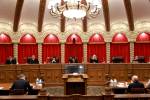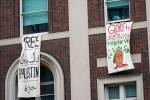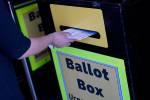Signing a petition and voting are not the same
There is no such thing as a risk-free democracy. Sometimes it gets a bit rough-and-tumble. Get in the scrum or wimp out.
This past week, the U.S. Supreme Court heard arguments in a case out of Washington state in which a series of John Does sought to have their signatures on a petition kept secret. They had signed a petition to overturn a state law allowing domestic partnerships. The referendum was placed on the ballot and rejected by the voters.
The petitioners' lawsuit said they feared they might be subject to harassment by gay rights activists. It is not an idle fear. In California, backers of a similar petition had their car windows broken, tires deflated and homes vandalized. A staircase in one home was soaked in urine. A waitress lost her job because of relentless protests outside the restaurant where she worked.
In order to block the release of the signers' names, the Does sued the Washington secretary of state, who under the state's public records law was obligated to release the names to whoever asked for them. The release of the names was enjoined until the higher court could hear the lawsuit.
It is a classic First Amendment case. It involves two of the five rights delineated there -- freedom of speech and the right to "petition the government for a redress of grievances."
The right to speak anonymously has long been established. Many of the essays and pamphlets penned by the Founders were printed under pseudonyms. But is there a right to petition anonymously?
Signing a petition is not merely advocacy, it is a legislative act.
Some might argue, and have, that the petition is tantamount to a secret ballot, which is right there in the Constitution, right?
Wrong. In fact, the Constitution does not guarantee a right to vote. As for the secret ballot, that was not widely adopted in this country until the 1890s, when we borrowed the concept from the Australians.
Justice Antonin Scalia made reference to this fact when questioning the attorney for the Does. He said, "And in light of the fact that for the first century of our existence, even voting was public -- you either did it raising your hand or by voice, or later, you had a ballot that was very visibly red or blue so that people knew which party you were voting for -- the fact is that running a democracy takes a certain amount of civic courage. And the First Amendment does not protect you from criticism or even nasty phone calls when you exercise your political rights to legislate, or to take part in the legislative process.
"You are asking us to enter into a whole new field where we have never gone before."
This history had earlier been addressed in an amicus brief filed by Lucy Dalglish, an attorney for The Reporters Committee for Freedom of the Press, on behalf of several journalism organizations and companies.
She wrote: "Petitioners emphasize the right to privacy in voting, but this focus is misplaced, given the secret ballot's history. The privacy concern was actually a secondary concern during the reform period, which focused primarily on the integrity of the voting process and the safety of the voters, instead of the individual right of privacy that is incidentally involved.
"In fact, before its adoption, many in the United States were vehemently opposed to a secret ballot, calling it cowardly and underhanded.
"The history behind the secret ballot is instructive for the Court's ruling in this case. Contrary to petitioners' suggestions, the right to a secret ballot was not established because of a privacy right or an interest in anonymous voting. Rather, the secret ballot was created because of a primary need to eliminate corruption in the voting process."
At several points during the argument, the possibility of businesses being boycotted because of political activity was brought up, which prompted a discussion of the Claiborne Hardware case from the civil rights era. In that case, the court held nonviolent economic boycotts are an exercise of First Amendment rights of speech, assembly, association, and petition to peaceably bring about political, social and economic change.
Several times during the arguments, it was noted that campaign contributions must be publicly reported, the implication being that there is little difference between cash and a signature in the political process.
The court appeared to be leaning correctly toward disclosure of the signers' names. Democracy comes with an element of discomfiture.
Thomas Mitchell is editor of the Review-Journal and writes on the role of the press, the First Amendment and access to public records. He may be contacted at 383-0261 or via e-mail at tmitchell@reviewjournal.com. Read his blog at lvrj.com/blogs/mitchell.























